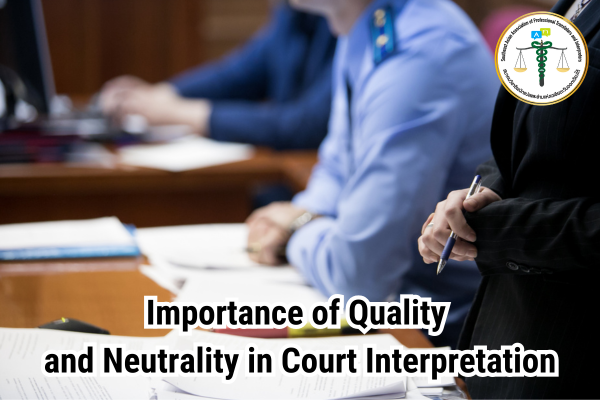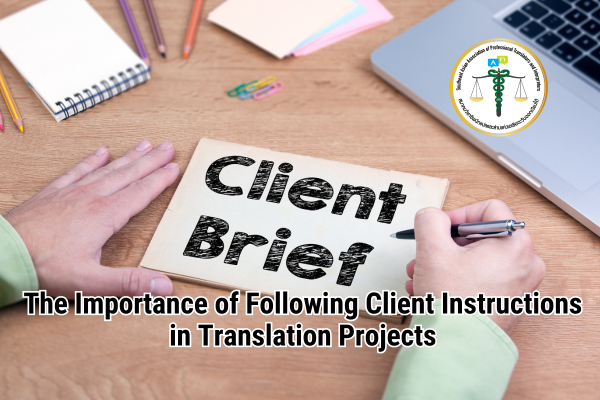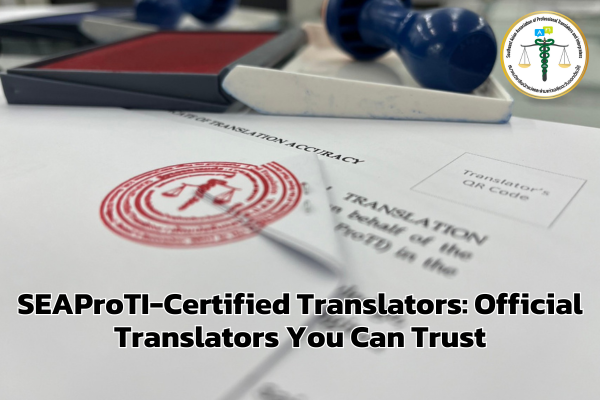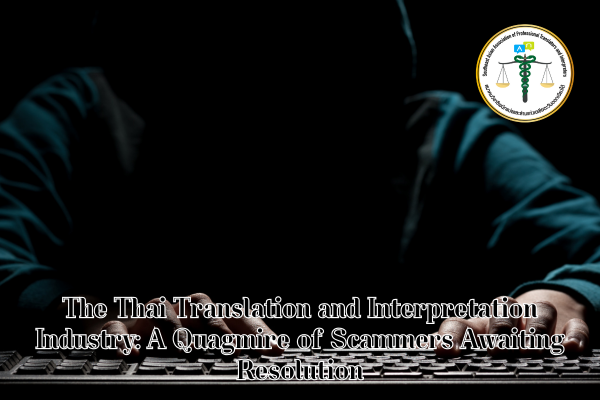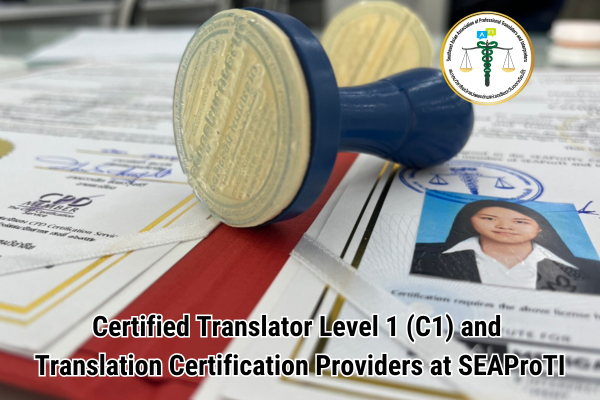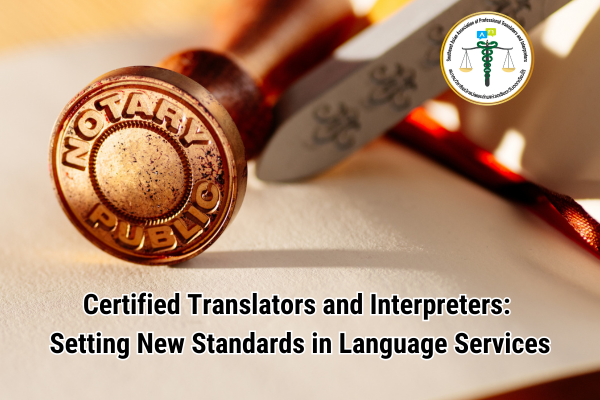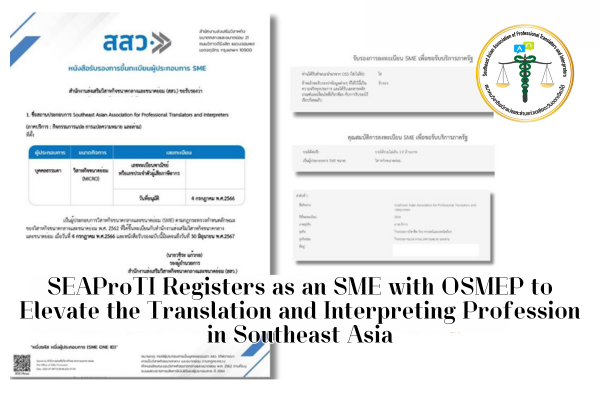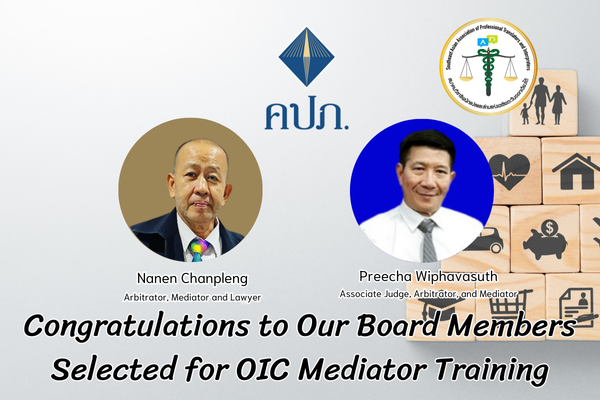Importance of Quality and Neutrality in Court Interpretation
In court proceedings, the accuracy and reliability of testimony translated by interpreters are crucial as they directly impact judicial decisions. However, the interpretation of testimony in Thai courts still faces several issues that undermine its credibility. This article discusses these challenges and provides recommendations for improving the standards of court interpreters in Thailand, categorized as follows:
1. Reformulating Testimonies Instead of Direct Translation (Hearsay)
One major issue is that some interpreters listen to testimony and then reformulate it rather than translating it verbatim. Such practices amount to hearsay and lead to distortions of the original meaning of the testimony. Interpreters should serve solely as conveyors of messages, refraining from altering the content to prevent complications in legal proceedings and ensure the authenticity of testimony.
2. Speaking Softly and the Issue of Transparency
Some Thai interpreters speak too softly, making it difficult for court participants to verify the translation. This lack of transparency may lead to disputes about the accuracy of the interpretation later. Interpreters should speak clearly and loudly enough for everyone in the courtroom to hear, and there should be a system for recording translations to provide evidence for accuracy if disputes arise.
3. Interfering with the Process of Recording Statements
In certain cases, interpreters attempt to adapt a witness’s words to align with the court’s format for recording statements, which is not their responsibility. Such alterations by interpreters can lead to distortions and misrepresentations of the witness’s intent. Interpreters should translate testimony comprehensively and leave the task of editing or summarizing statements to the judge.
4. Arbitrary Omission of Words
Some interpreters omit parts of testimony they consider unimportant, assuming that judges will not record them. However, interpreters do not have the authority to make such decisions. These omissions can lead to a loss of essential context. Interpreters should fully translate all testimony, leaving it to the judge’s discretion to decide what should or should not be recorded.
5. Independence and Neutrality of Interpreters
Independence and neutrality are critical traits for courtroom interpreters. They must not have any vested interests or close relationships with witnesses, such as being a lawyer familiar with the case, a relative, or a close friend of the witness. Such relationships compromise the interpreter’s neutrality. If such conflicts arise, objections should be raised, and a new, independent interpreter should be appointed.
6. Lack of Standards and Training
In Thailand, court interpreting lacks clear standards compared to other countries. Courtroom interpreters should undergo training and certification by credible organizations to ensure their skills and knowledge meet the required standards. Preparing for a case beforehand is also crucial, as it allows interpreters to provide accurate and comprehensive translations.
Recommendations
To enhance the quality of courtroom interpretation in Thailand and build trust in the judicial process, the following measures should be taken:
-
Establish a Certification System for Court Interpreters: Interpreters should undergo training and examinations to certify their competence in court interpreting, ensuring they meet standards aligned with international principles. Currently, employers have the option to use interpreters from SEAProTI.
-
Develop Comprehensive Training Programs: Offer training programs covering legal knowledge, ethics, and interpretation skills specific to courtroom settings.
-
Utilize Technology for Monitoring: Courts should implement audio or video recording systems to verify translations in cases of disputes.
-
Define Clear Guidelines: Develop clear guidelines for court interpreters, including translating testimony in full, maintaining neutrality, and avoiding conflicts of interest.
-
Raise Awareness: Promote understanding among all judicial stakeholders about the importance of high-quality and neutral court interpretation.
Conclusion
Interpreters in courtrooms play a vital role in bridging the communication gap between witnesses and the judiciary. The reliability of testimony translated by interpreters directly affects court proceedings. Issues such as reformulating testimonies, speaking softly, or lacking neutrality can be addressed through strict certification standards and comprehensive training programs. Improving the quality of court interpreters in Thailand will enhance trust in the judicial process and promote sustainable justice in society.
SEAProTI’s certified translators, translation certification providers, and certified interpreters:
The Southeast Asian Association of Professional Translators and Interpreters (SEAProTI) has officially announced the criteria and qualifications for individuals to register as “Certified Translators,” “Translation Certification Providers,” and “Certified Interpreters” under the association’s regulations. These guidelines are detailed in Sections 9 and 10 of the Royal Thai Government Gazette, issued by the Secretariat of the Cabinet under the Office of the Prime Minister of the Kingdom of Thailand, dated July 25, 2024, Volume 141, Part 66 Ng, Page 100.
To read the full publication, visit the Royal Thai Government Gazette
ความสำคัญของคุณภาพและความเป็นกลางในการแปลของล่ามในศาล
ในกระบวนการพิจารณาคดีในศาล ความถูกต้องและน่าเชื่อถือของคำเบิกความที่ผ่านการแปลของล่ามมีความสำคัญยิ่ง เนื่องจากมีผลกระทบต่อการพิจารณาคดีและการตัดสินใจของผู้พิพากษา อย่างไรก็ตาม การแปลคำเบิกความผ่านล่ามในศาลไทยยังมีปัญหาในหลายประเด็นที่ส่งผลต่อความน่าเชื่อถือของคำเบิกความ บทความนี้จะกล่าวถึงปัญหาและข้อเสนอแนะเกี่ยวกับการพัฒนามาตรฐานของล่ามในศาลไทย โดยแบ่งเป็นหัวข้อดังต่อไปนี้:
1. การปรับถ้อยคำแทนการแปลตรงตัว (Hearsay)
หนึ่งในปัญหาที่สำคัญที่สุดคือ การที่ล่ามบางคนฟังคำเบิกความจากพยานแล้วนำมาปรับเป็นถ้อยคำใหม่แทนที่จะถ่ายทอดความหมายอย่างตรงไปตรงมา การกระทำดังกล่าวถือว่าเป็นการบอกเล่าผ่านล่าม (Hearsay) ซึ่งทำให้ความหมายของคำเบิกความดั้งเดิมคลาดเคลื่อนออกไป ล่ามควรทำหน้าที่เป็นเพียงผู้ถ่ายทอดข้อความโดยตรง โดยไม่ปรับเปลี่ยนเนื้อหาใดๆ เพื่อป้องกันปัญหาที่อาจเกิดขึ้นในการพิจารณาคดีและเพื่อคงความถูกต้องของคำเบิกความ
2. การพูดเสียงเบาและปัญหาความโปร่งใส
ล่ามไทยบางคนมีปัญหาเรื่องการพูดเสียงเบา ทำให้ผู้ที่อยู่ในศาลไม่สามารถตรวจสอบหรือฟังคำแปลได้ชัดเจน ความไม่โปร่งใสดังกล่าวส่งผลให้เกิดข้อโต้แย้งเกี่ยวกับความถูกต้องของคำแปลในภายหลัง ล่ามควรพูดเสียงดังและชัดเจนพอที่ทุกฝ่ายในศาลจะสามารถฟังคำแปลได้ และควรมีระบบบันทึกเสียงการแปลเพื่อใช้เป็นหลักฐานในการตรวจสอบความถูกต้องในกรณีที่เกิดข้อพิพาท
3. การแทรกแซงกระบวนการบันทึกถ้อยคำ
ในบางกรณี ล่ามพยายามปรับถ้อยคำของพยานเพื่อให้ตรงกับรูปแบบการบันทึกของผู้พิพากษา ซึ่งไม่ใช่หน้าที่ของล่าม การปรับเปลี่ยนถ้อยคำโดยล่ามอาจทำให้ความหมายคลาดเคลื่อนและไม่ตรงกับเจตนารมณ์ของพยาน ล่ามควรแปลคำเบิกความให้ครบถ้วนตามต้นฉบับโดยไม่ตัดหรือเพิ่มข้อความใดๆ หน้าที่การตัดสินใจเกี่ยวกับการบันทึกถ้อยคำควรเป็นของผู้พิพากษาเพียงผู้เดียว
4. การตัดคำโดยพละการ
ล่ามบางคนตัดคำเบิกความที่คิดว่าไม่สำคัญออก โดยเชื่อว่าผู้พิพากษาจะไม่บันทึกคำเหล่านั้น แต่ในความเป็นจริง ล่ามไม่มีสิทธิ์ในการตัดสินใจเช่นนั้น การกระทำดังกล่าวอาจทำให้ความหมายที่แท้จริงของคำเบิกความสูญหาย ล่ามจึงควรถ่ายทอดข้อความทั้งหมดโดยไม่ตัดทอน ให้เป็นหน้าที่ของผู้พิพากษาในการตัดสินใจว่าจะบันทึกหรือไม่บันทึกคำใด
5. ความเป็นอิสระและความเป็นกลางของล่าม
ความเป็นอิสระและความเป็นกลางเป็นคุณสมบัติที่สำคัญของล่ามในศาล ล่ามต้องไม่มีส่วนได้ส่วนเสียหรือมีความสัมพันธ์ใกล้ชิดกับพยาน เช่น การเป็นทนายความที่เกี่ยวข้องกับคดี การเป็นญาติ หรือเป็นเพื่อนสนิทของพยาน ความสัมพันธ์เช่นนี้อาจทำให้ล่ามไม่สามารถทำหน้าที่อย่างเป็นกลางได้ หากเกิดกรณีดังกล่าว ควรมีการคัดค้านคุณสมบัติของล่ามและหาล่ามคนใหม่ที่ไม่มีส่วนเกี่ยวข้องกับคดีความ
6. การขาดมาตรฐานและการอบรม
ในประเทศไทย การล่ามในศาลยังขาดมาตรฐานที่ชัดเจนเมื่อเทียบกับประเทศอื่นๆ ล่ามในศาลควรผ่านการอบรมและการรับรองจากองค์กรที่มีความน่าเชื่อถือ เพื่อให้มั่นใจว่าล่ามมีความรู้และทักษะเพียงพอในการทำหน้าที่ การเตรียมคดีก่อนการแปลก็เป็นสิ่งสำคัญ ล่ามควรมีโอกาสศึกษาเนื้อหาคดีล่วงหน้าเพื่อให้สามารถแปลได้อย่างถูกต้องและครบถ้วน
ข้อเสนอแนะ
เพื่อยกระดับคุณภาพของการแปลในศาลไทยและสร้างความน่าเชื่อถือในกระบวนการพิจารณาคดี ควรดำเนินการดังนี้:
-
จัดให้มีระบบรับรองล่ามที่จะไปแปลในศาล: ล่ามควรผ่านการอบรมและการสอบเพื่อรับรองความสามารถในการแปลในศาล โดยควรมีมาตรฐานที่สอดคล้องกับหลักสากล ปัจจุบัน นายจ้างสามารถเลือกใช้ล่ามจาก SEAProTI ได้เนื่องจากมีการฝึกอบรมสอดคล้องกับหลักสากล
-
พัฒนาหลักสูตรอบรม: จัดหลักสูตรอบรมสำหรับล่ามที่ครอบคลุมทั้งด้านกฎหมาย จรรยาบรรณ และทักษะการแปลในบริบทของศาล
-
ใช้เทคโนโลยีในการตรวจสอบ: ศาลควรติดตั้งระบบบันทึกเสียงหรือวิดีโอเพื่อใช้ตรวจสอบคำแปลในกรณีที่เกิดข้อพิพาท
-
กำหนดแนวทางปฏิบัติที่ชัดเจน: ออกแนวทางปฏิบัติสำหรับล่ามในศาล เช่น การแปลคำเบิกความให้ครบถ้วน การรักษาความเป็นกลาง และการหลีกเลี่ยงการมีส่วนได้ส่วนเสียในคดี
-
สร้างความตระหนักรู้: ส่งเสริมให้ทุกฝ่ายในกระบวนการยุติธรรมเข้าใจถึงความสำคัญของล่ามที่มีคุณภาพและความเป็นกลางในศาล
สรุป
ล่ามในศาลมีบทบาทสำคัญในการสร้างความเข้าใจระหว่างพยานและศาล ความน่าเชื่อถือของคำเบิกความที่ผ่านการแปลจึงมีผลโดยตรงต่อการพิจารณาคดี ปัญหาเกี่ยวกับการแปลของล่ามที่ไม่ได้รับการรับรอง เช่น การปรับถ้อยคำ การพูดเสียงเบา หรือการขาดความเป็นกลาง สามารถแก้ไขได้ด้วยการกำหนดมาตรฐานและการพัฒนาระบบรับรองที่เข้มงวด การยกระดับคุณภาพของล่ามในศาลไทยจะช่วยเพิ่มความเชื่อมั่นในกระบวนการยุติธรรมและส่งเสริมความยุติธรรมในสังคมอย่างยั่งยืน
เกี่ยวกับนักแปลรับรอง ผู้รับรองการแปล และล่ามรับรองของสมาคมวิชาชีพนักแปลและล่ามแห่งเอเชียตะวันออกเฉียงใต้
สมาคมวิชาชีพนักแปลและล่ามแห่งเอเชียตะวันออกเฉียงใต้ (SEAProTI) ได้ประกาศหลักเกณฑ์และคุณสมบัติผู้ที่ขึ้นทะเบียนเป็น “นักแปลรับรอง (Certified Translators) และผู้รับรองการแปล (Translation Certification Providers) และล่ามรับรอง (Certified Interpreters)” ของสมาคม หมวดที่ 9 และหมวดที่ 10 ในราชกิจจานุเบกษา ของสำนักเลขาธิการคณะรัฐมนตรี ในสำนักนายกรัฐมนตรี แห่งราชอาณาจักรไทย ลงวันที่ 25 ก.ค. 2567 เล่มที่ 141 ตอนที่ 66 ง หน้า 100 อ่านฉบับเต็มได้ที่: นักแปลรับรอง ผู้รับรองการแปล และล่ามรับรอง


